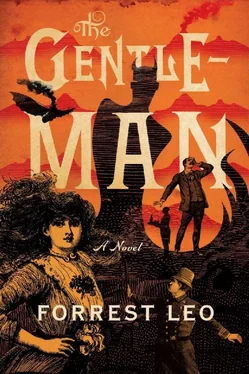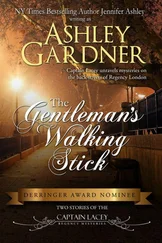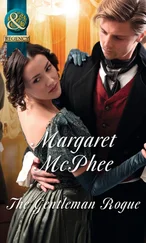‘The government doesn’t approve of our work, I’m afraid,’ Kensington says. ‘They feel that we represent a threat to social order, and accuse us of anarchic leanings.’
‘That’s preposterous!’ exclaims Lancaster.
‘No doubt,’ says Kensington, ‘but after all, they are the government.’*
‘Quite so,’ nods Lancaster. ‘But still, it’s strange. You’d think they would want to nationalise Progress, wouldn’t you?’
‘Oh, they do,’ agrees Kensington. ‘But only at a certain speed. Exceed that and they feel things are moving too quickly and it makes them nervous. Their philosophers—’
‘The government’s?’
‘Yes, yes, or whatever you call them. Theorists . They say that there is a fixed rate at which a society may evolve, particularly on a technological and industrial front. Above that rate, they say, the potential for social unrest increases exponentially.’
‘And this club is full of people who invent above the rate?’
‘I don’t mean to boast, but this club is full of people who invent at such a rate that the store of human knowledge doubles on a weekly basis.’
I suppose this is hyperbole, but then I recall the automaton and cannot help but wonder. We have in this time climbed several staircases. On the lower storeys they were grand and sweeping, but as we ascend they grow narrower and narrower until they twist themselves into a spiral.
‘Like Burton’s painting, what?’ notes Lancaster. I resist the urge to strike him.
Unaccustomed to physical exertion, I am by this time breathing heavily. Kensington notices and says with concern, ‘I’m very sorry for the climb, sir. But my experiments being chiefly of an aeronautical nature, I requested the highest rooms in the club.’
His ‘rooms,’ when we reach them, prove to be a single garret, tiny and cluttered — but for all that, the most poetical space I have ever seen. The wallpaper is a hideous shade of yellow, but can scarce be made out for it is covered, every inch, by diagrams, notes, and calculations. There is a washbasin in a corner, a small bed buried under a pile of technical treatises, and a workbench along the western wall. The eastern is dominated by a tremendous window looking out over London, which in the glow of gaslight looks strangely peaceful. We are much higher than I had realised and the few people illuminated by streetlamps look like insects. They are policemen and beggars and prostitutes and dissolute young men out too late and staggering home, no doubt — but from this vantage they seem like so many ants, without personality, vice, or history.*
Kensington’s workbench is strewn with tools and models. The tools appear ordinary, but the models are anything but. They are of every conceivable design, but every one a sort of flying machine. There are balloons, gliders, birds’ wings made of cloth and the most intricately and delicately carved wood, tall ships complete with sails and masts and bowsprits but with wings sprouting from their sides, and countless notions which I do not believe have names but I wish dearly I could show to you, for they are unlike anything I have ever seen in ingenuity and wonder.
Lancaster and I are both rendered dumb by the cumulative effect of this enclave of wonders. Kensington, though, is quite businesslike, if a little awkward and darting in his manner. I believe we make him nervous. He hastily clears of impediment the two chairs in the room and offers them to us, then shoves papers off the foot of the bed and perches there.
‘So,’ he says when we are all properly situated, ‘what was it that you wished to discuss?’
‘You are aware, I think, that I sold my wife to the Devil?’
‘Yes,’ he says, nodding eagerly, ‘you said as much earlier this evening. A most interesting conversation it was, too.’
‘Well, something terrible has happened since then — I believe partly as a direct result of said discussion — and I have realised that I am in fact overwhelmingly in love with her.’
‘Oh, but that’s wonderful!’ he cries. ‘Felicitations!’ He makes a move as though to shake my hand, then thinks better of it, evidently uncertain of the proper response to such news. He shifts awkwardly on the bed and looks politely at me to continue.
‘Thank you. But it leaves us with quite an interesting situation, which is that I need to get her back.’
‘Your wife?’
‘Yes.’
‘From the Devil — yes, I see. Interesting indeed. Potentially rather difficult, too, I suppose?’
‘So it seems.’
‘Where precisely does one go on such an errand?’
‘That is the question,’ I reply. He leans in, all attention. ‘I believe that I have—’
Lancaster coughs discreetly.
‘I believe,’ I amend, ‘that Lancaster and Tompkins and Lizzie — she’s my sister, I think I mentioned; you’ll quite like her — and I have together come to the conclusion that the entrance to Hell, or at least one entrance to Hell — we are not sure but that there may be more than one — is the crater of a volcano in Iceland called Snaefellsjökul. But here’s the rub, Will Kensington. Iceland is a dishearteningly far way off, and we do not know how much time we may or may not have until my wife becomes permanently ensconced in the underworld.’
‘Oh I see,’ he says gravely. ‘Yes, that is a conundrum, isn’t it?’
‘So we thought,’ I say. ‘But perhaps not so. You see, I heard rumours of a young inventor with a flying machine…’
There is a pause. Kensington looks very pensive. Lancaster and I are both leaning so far forward in our seats that we are nearly standing. Kensington rises. He extends his hand and says solemnly, ‘Mr Savage, I would consider it a great honour to be permitted to help you on your errand. My person and my flying machine are at your service.’
I take his hand with equal gravity and make a small bow.*
‘Well, now that’s settled,’ says Lancaster, ‘you must tell us all about sailing the sky!’
Eleven In Which We Find Something Marvellous on Hampstead Heath
Hampstead Heath at dawn is a place of mist, birdsong, and affairs of honour. It is not uncommon for the serenity of a morning to be shattered by pistol shots, or for early passers-by to hear the clink of smallswords, the muffled calls of wounded men, and occasionally the cry of women. These glorious sounds have always evoked within me a sort of patriotic fervour. Since the commencement of my own duelling career some twelve hours ago, I note that they bring an added sensation. I feel as though I now belong to a club the existence of which I was not even aware the day before yesterday.
I am not a bloodthirsty fellow. Before my encounter with Lancaster I had never struck a man or been struck. (Except by Lizzie, but that doesn’t count.) But I have all my life had a fascination with the fiercer aspects of human nature. I am quite taken with the warrior ethos — and I use ‘warrior’ as a term distinct from ‘soldier,’ which I take to mean a man whose profession is waging war. A warrior does not fight for profit, but for something deeper. Honour is a part of it, but does not I think capture the entirety. There is something more, something almost monkish, which I have always admired in an abstracted sort of way.* There is a resolve in the spirit of a warrior that I did not think that I possessed. Since the events of yesterday, however, I wonder if it mayn’t in fact be lying dormant somewhere deep within me. I have found in myself a vigour of spirit with which I was hitherto unacquainted. It pleases me, and I think a little better of myself than I did before.*
As we approach the Heath, we pass duelling parties returning to town. They are typically comprised of five men: a doctor, two seconds, the victor (looking proud but restrained), and the vanquished (bandaged, assisted by the seconds if wounded in the leg, carried on a litter if struck in the torso or the head or if dead). There is sometimes a variation in the party — a lady may be present. These are my favourite groups to observe. The lady is without exception very beautiful and a little haughty, and she is often weeping or bravely attempting not to. The men of parties which include a lady are different than men of the other sort. They stand taller and their eyes are brighter. The wounded is not so pathetic, and the victor is humbler.
Читать дальше












